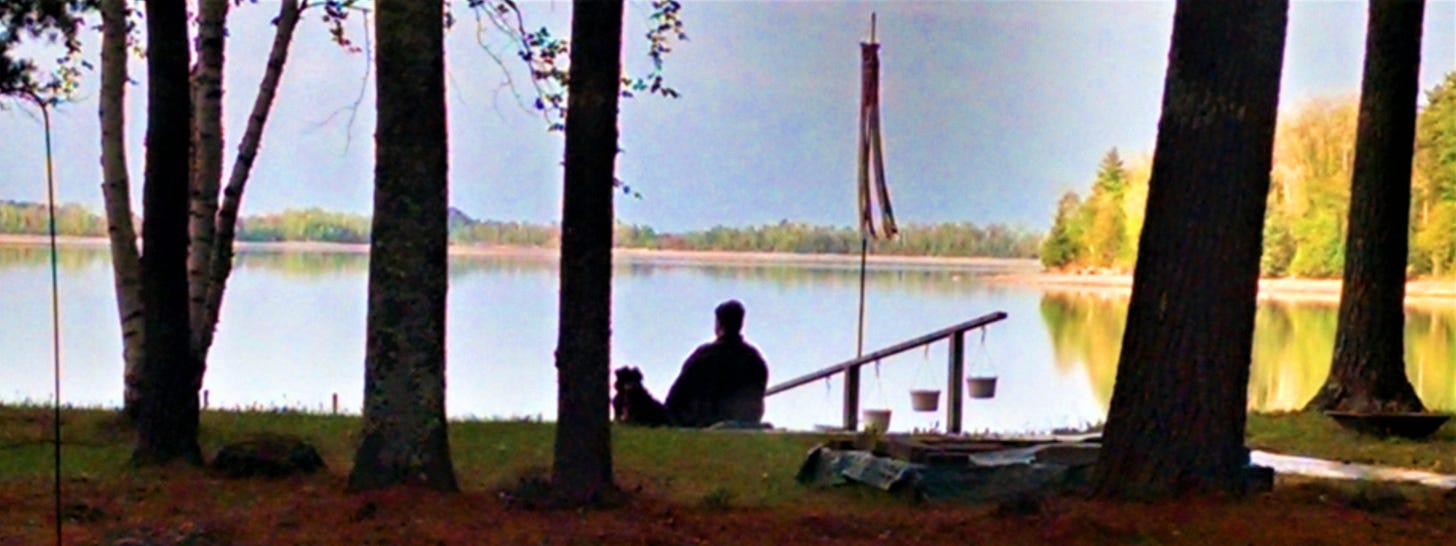Meditation can be quite difficult for those with very little experience meditating. When we first start examining mind, we must do so honestly, with devotion to the ineffable. Sometimes people sort of pretend to meditate, being more interested in outward appearances. In time, they may find a teaching from a master that tells us that our practice must be effortless. That’s it, they quit this charade, falling back to where they began, completely at the mercy of karma once again.
This is really too bad. Genuine meditation masters all say that we must practice meditation until we are fully enlightened. If we do less than that, it is of no use to even begin. This is why we must cultivate Bodhicitta, which begins with a burning desire to awaken. Awakening begins with us cultivating great compassion, seeing our own misery in cyclic existence as something we need to extinguish once and for all. A moment of peace here or there is not the point of meditation.
In The Frog: A Spiritual Autobiography, Spanning Many Lifetimes, I describe developing an almost supernatural level of devotion and determination, perseverance beyond all reason, or sisu. I describe facing millions of demons, pushing my way through all unpleasantries, as well as letting go of pleasure. This is not easy, even if you might think of yourself as spiritually advanced. It’s very easy to get discouraged, if you don’t have a strong foundation of Bodhicitta.
It took me many lifetimes to discover Dzogchen. In each lifetime after that, I had to build my Spiritual Practice from the ground up, going back to Bodhicitta each time. When we are reborn, we aren’t able to hang on to most memories. We can’t automatically speak languages we’ve spoken before. We can’t automatically pick up with our Spiritual Practice where we had left off in our past lifetime. With each lifetime comes new problems and new circumstances. Old and vanished past lifetimes don’t help us much. We must deal with what is here now.
In this lifetime, I was observed meditating while I was still a baby. This was very odd to the people who surrounded me, because Buddhism is virtually unknown where I grew up. I kept this up, meditating in remote places for most of my lifetime, until I encountered Buddhism. After that, I quickly proceeded through all the Yanas, or Spiritual Vehicles of Buddhism, until being introduced to the Nature of Mind, thus becoming a Dzogchen practitioner. This was quite familiar to me, due to previous life experiences; however, I still needed to do the hard work of meditation in order to get there.
With the first Yana, a practitioner is really only interested in personal happiness. This is very nice, and one should not be in any hurry to go beyond such simple teachings. It takes time to acclimate to meditation, and this is an important step. As the Yanas progress, it becomes apparent that happiness is not the goal. Awakening is the goal. If one wishes to awaken, one must be willing to face anything, look at your mind honestly and with courage. It won’t be fun.
So many people who have prematurely received Dzogchen teachings fall into a trap where they think that it’s okay to stop, to do nothing, to give up, because they have simply misunderstood what this means to discover who you really are. This makes me sad, because it ignores what all the great Dzogchen masters have taught, which is to not fall into traps of complacency, nihilism or eternalism. Our Real Nature requires effortless attention or else there is no hope of awakening.
As I began practicing, when I was an infant, I kept it simple, merely observing mind. This had its surprises; however, I knew enough to simply remain determined, remaining calm amid the energetic displays. I had that built in me from past lifetimes— no big deal. I still needed to mature as a Spiritual Practitioner. I still needed to become introduced to some very serious methodology for meditating. This took time, and I needed to be ready to meet my first lama in this lifetime.
A Spiritual Journey can also be quite wild, which is odd to think about, especially because we don’t really go anywhere. In a more rigorous endeavor of Spiritual Practice, I encountered much more than I’m willing to discuss in detail. It takes a lot to move quickly, which I talk about in The Frog, that it was quite necessary for me to do so, due to circumstances.
When I made my way through the Vajrayana, I applied great effort, often meditating many hours each day, as well as throughout my dreams. It was exhausting at times. When we are working with mind, we discover much that we didn’t know we had. Much of it can be quite terrifying or repulsive. As a Vajrayana practitioner, we know we must transform everything that we encounter. This is exhausting, especially over many years of day and night practice, utilizing every moment that we have.
After all that, when I encountered Dzogchen, I said two things: First, it is worth it, and second, now is where the real work begins. Keep going, you will awaken. Don’t ever give up.
Blessings in Light,
Robert Aho




i never got that"ho-ho-ho"in the frog
now i see a glimpse of it,thanks;)
mögen alle wesen erwachen
christof
So inspiring, Robert. Thank you.
Yes, there are popular currents, like Neo-Advaita, that conflate Absolute and relative in their "don´t do anything, you´re already your True Self", which leads to disaster.